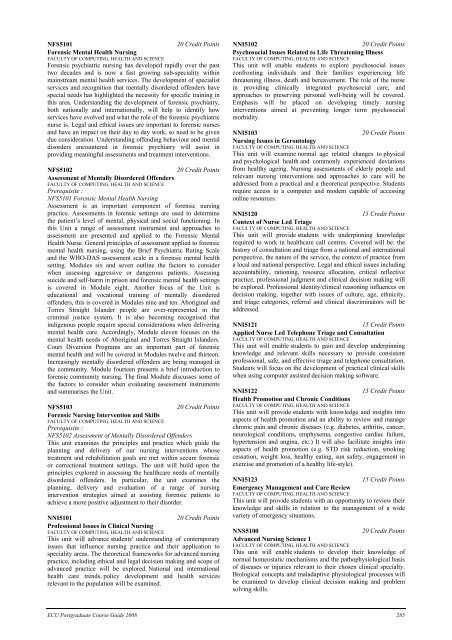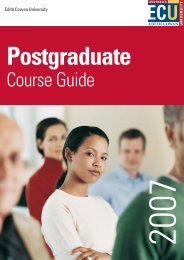Postgraduate - Edith Cowan University
Postgraduate - Edith Cowan University
Postgraduate - Edith Cowan University
You also want an ePaper? Increase the reach of your titles
YUMPU automatically turns print PDFs into web optimized ePapers that Google loves.
NFS5101 20 Credit Points<br />
Forensic Mental Health Nursing<br />
FACULTY OF COMPUTING, HEALTH AND SCIENCE<br />
Forensic psychiatric nursing has developed rapidly over the past<br />
two decades and is now a fast growing sub-speciality within<br />
mainstream mental health services. The development of specialist<br />
services and recognition that mentally disordered offenders have<br />
special needs has highlighted the necessity for specific training in<br />
this area. Understanding the development of forensic psychiatry,<br />
both nationally and internationally, will help to identify how<br />
services have evolved and what the role of the forensic psychiatric<br />
nurse is. Legal and ethical issues are important to forensic nurses<br />
and have an impact on their day to day work, so need to be given<br />
due consideration. Understanding offending behaviour and mental<br />
disorders encountered in forensic psychiatry will assist in<br />
providing meaningful assessments and treatment interventions.<br />
NFS5102 20 Credit Points<br />
Assessment of Mentally Disordered Offenders<br />
FACULTY OF COMPUTING, HEALTH AND SCIENCE<br />
Prerequisite :<br />
NFS5101 Forensic Mental Health Nursing<br />
Assessment is an important component of forensic nursing<br />
practice. Assessments in forensic settings are used to determine<br />
the patient’s level of mental, physical and social functioning. In<br />
this Unit a range of assessment instrument and approaches to<br />
assessment are presented and applied to the Forensic Mental<br />
Health Nurse. General principles of assessment applied to forensic<br />
mental health nursing, using the Brief Psychiatric Rating Scale<br />
and the WHO-DAS assessment scale in a forensic mental health<br />
setting. Modules six and seven outline the factors to consider<br />
when assessing aggressive or dangerous patients. Assessing<br />
suicide and self-harm in prison and forensic mental health settings<br />
is covered in Module eight. Another focus of the Unit is<br />
educational and vocational training of mentally disordered<br />
offenders, this is covered in Modules nine and ten. Aboriginal and<br />
Torres Straight Islander people are over-represented in the<br />
criminal justice system. It is also becoming recognised that<br />
indigenous people require special considerations when delivering<br />
mental health care. Accordingly, Module eleven focuses on the<br />
mental health needs of Aboriginal and Torres Straight Islanders.<br />
Court Diversion Programs are an important part of forensic<br />
mental health and will be covered in Modules twelve and thirteen.<br />
Increasingly mentally disordered offenders are being managed in<br />
the community. Module fourteen presents a brief introduction to<br />
forensic community nursing. The final Module discusses some of<br />
the factors to consider when evaluating assessment instruments<br />
and summarises the Unit.<br />
NFS5103 20 Credit Points<br />
Forensic Nursing Intervention and Skills<br />
FACULTY OF COMPUTING, HEALTH AND SCIENCE<br />
Prerequisite :<br />
NFS5102 Assessment of Mentally Disordered Offenders<br />
This unit examines the principles and practice which guide the<br />
planning and delivery of our nursing interventions whose<br />
treatment and rehabilitation goals are met within secure forensic<br />
or correctional treatment settings. The unit will build upon the<br />
principles explored in assessing the healthcare needs of mentally<br />
disordered offenders. In particular, the unit examines the<br />
planning, delivery and evaluation of a range of nursing<br />
intervention strategies aimed at assisting forensic patients to<br />
achieve a more positive adjustment to their disorder.<br />
NNI5101 20 Credit Points<br />
Professional Issues in Clinical Nursing<br />
FACULTY OF COMPUTING, HEALTH AND SCIENCE<br />
This unit will advance students' understanding of contemporary<br />
issues that influence nursing practice and their application to<br />
speciality areas. The theoretical frameworks for advanced nursing<br />
practice, including ethical and legal decision making and scope of<br />
advanced practice will be explored. National and international<br />
health care trends, policy development and health services<br />
relevant to the population will be examined.<br />
NNI5102 20 Credit Points<br />
Psychosocial Issues Related to Life Threatening Illness<br />
FACULTY OF COMPUTING, HEALTH AND SCIENCE<br />
This unit will enable students to explore psychosocial issues<br />
confronting individuals and their families experiencing life<br />
threatening illness, death and bereavement. The role of the nurse<br />
in providing clinically integrated psychosocial care, and<br />
approaches to preserving personal well-being will be covered.<br />
Emphasis will be placed on developing timely nursing<br />
interventions aimed at preventing longer term psychosocial<br />
morbidity.<br />
NNI5103 20 Credit Points<br />
Nursing Issues in Gerontology<br />
FACULTY OF COMPUTING, HEALTH AND SCIENCE<br />
This unit will examine normal age related changes to physical<br />
and psychological health and commonly experienced deviations<br />
from healthy ageing. Nursing assessments of elderly people and<br />
relevant nursing interventions and approaches to care will be<br />
addressed from a practical and a theoretical perspective. Students<br />
require access to a computer and modem capable of accessing<br />
online resources.<br />
NNI5120 15 Credit Points<br />
Context of Nurse Led Triage<br />
FACULTY OF COMPUTING, HEALTH AND SCIENCE<br />
This unit will provide students with underpinning knowledge<br />
required to work in healthcare call centres. Covered will be: the<br />
history of consultation and triage from a national and international<br />
perspective, the nature of the service, the context of practice from<br />
a local and national perspective. Legal and ethical issues including<br />
accountability, rationing, resource allocation, critical reflective<br />
practice, professional judgment and clinical decision making will<br />
be explored. Professional identity/clinical reasoning influences on<br />
decision making, together with issues of culture, age, ethnicity,<br />
and triage categories, referral and clinical discriminators will be<br />
addressed.<br />
NNI5121 15 Credit Points<br />
Applied Nurse Led Telephone Triage and Consultation<br />
FACULTY OF COMPUTING, HEALTH AND SCIENCE<br />
This unit will enable students to gain and develop underpinning<br />
knowledge and relevant skills necessary to provide consistent<br />
professional, safe, and effective triage and telephone consultation.<br />
Students will focus on the development of practical clinical skills<br />
when using computer assisted decision making software.<br />
NNI5122 15 Credit Points<br />
Health Promotion and Chronic Conditions<br />
FACULTY OF COMPUTING, HEALTH AND SCIENCE<br />
This unit will provide students with knowledge and insights into<br />
aspects of health promotion and an ability to review and manage<br />
chronic pain and chronic diseases (e.g. diabetes, arthritis, cancer,<br />
neurological conditions, emphysema, congestive cardiac failure,<br />
hypertension and angina, etc.) It will also facilitate insights into<br />
aspects of health promotion (e.g. STD risk reduction, smoking<br />
cessation, weight loss, healthy eating, sun safety, engagement in<br />
exercise and promotion of a healthy life-style).<br />
NNI5123 15 Credit Points<br />
Emergency Management and Care Review<br />
FACULTY OF COMPUTING, HEALTH AND SCIENCE<br />
This unit will provide students with an opportunity to review their<br />
knowledge and skills in relation to the management of a wide<br />
variety of emergency situations.<br />
NNS5100 20 Credit Points<br />
Advanced Nursing Science 1<br />
FACULTY OF COMPUTING, HEALTH AND SCIENCE<br />
This unit will enable students to develop their knowledge of<br />
normal homeostatic mechanisms and the pathophysiological basis<br />
of diseases or injuries relevant to their chosen clinical specialty.<br />
Biological concepts and maladaptive physiological processes will<br />
be examined to develop clinical decision making and problem<br />
solving skills.<br />
ECU <strong>Postgraduate</strong> Course Guide 2008 285



